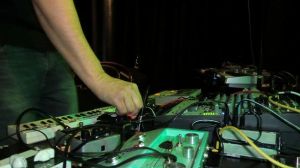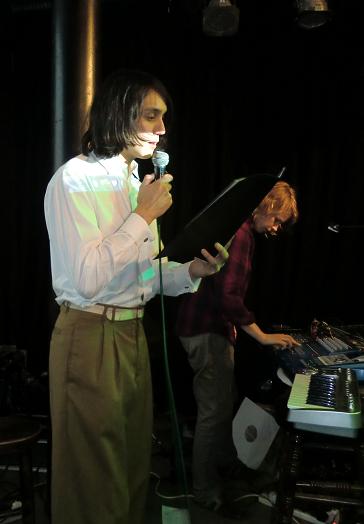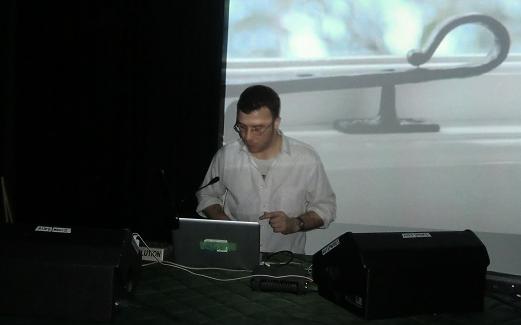Mordant Mass, The Vortex | reviews, news & interviews
Mordant Mass, The Vortex
Mordant Mass, The Vortex
Deep bass, surging electricity and broken crooning at the jazz club
Avant-garde art, by its very nature, always treads a fine line between the sublime and the ridiculous, and between entertainment and alienation. Thankfully this is something understood very well by the joint curators of Friday night's show at the Vortex Jazz Club: Baron Mordant of the Mordant Music record label and Jonny Mugwump of the Exotic Pylon website and radio show. As the names perhaps suggest, these are people versed in the potential deep silliness of what they do, even as they take it very seriously indeed – and their event certainly ranged far and wide between the weird, the wonderful and the out-and-out wrong.
Watch snippets of MisinforMation
 Bristol-based Nick Edwards has previously been better known for his Gutterbreakz electronic music blog. Gutterbreakz notably documented the emergence of the dubstep scene in the city, but also has a very personal take on electronic music past, whether that be the abrasive experiments of Suicide and Cabaret Voltaire or the production innovations of original Jamaican dub. And his music as Ekoplekz reflects these interests closely – constructed without computers, it was made from an intricately inter-connected circuit of archaic sound-processing devices (pictured right), and in sharp contrast to the grid-pattern neatness of modern electronic dance music, it really gave the impression of barely controlled electricity surging around this circuit.
Bristol-based Nick Edwards has previously been better known for his Gutterbreakz electronic music blog. Gutterbreakz notably documented the emergence of the dubstep scene in the city, but also has a very personal take on electronic music past, whether that be the abrasive experiments of Suicide and Cabaret Voltaire or the production innovations of original Jamaican dub. And his music as Ekoplekz reflects these interests closely – constructed without computers, it was made from an intricately inter-connected circuit of archaic sound-processing devices (pictured right), and in sharp contrast to the grid-pattern neatness of modern electronic dance music, it really gave the impression of barely controlled electricity surging around this circuit.
Many modern noise musicians, such as Astral Social Club, use this kind of analogue technology, but Ekoplekz has a rare finesse, and – crucially – that grounding in dub reggae which gives his pieces a heavy, if ragged, groove. The sound was dense, echoes of simple tones or vocal interjections growing into surging waves of noise, but every time it threatened to become harsh or overwhelming a flurry of chirrups would fly in from the corner of the soundfield, or a clicketty-clack percussion pattern would rise up through the fug, throwing everything into relief and re-emphasising that groove. It was music that had its effect through immersion and duration – while Ekoplekz's releases thus far have been great, live he was a revelation, and the growing crowd of nerds and bohos gave him their rapt attention.
Listen to Vindicatrix's "Hume"
 Vindicatrix – David Aird (pictured left) – was rather less of one. Even as he prepared himself on the stage, tinkering with an even more rickety collection of old sound-makers than Ekoplekz, it was clear from his dress shirt, high-waisted trousers and floppy hair that there was something arch about him – and his performance confirmed this and then some. Moaning Michael Jackson's “Human Nature” (retitled "Hume") in a startlingly close approximation to Scott Walker's careworn voice over a sickly collision of detuned samples and electro beats was certainly startling, but a rather over-rich concoction.
Vindicatrix – David Aird (pictured left) – was rather less of one. Even as he prepared himself on the stage, tinkering with an even more rickety collection of old sound-makers than Ekoplekz, it was clear from his dress shirt, high-waisted trousers and floppy hair that there was something arch about him – and his performance confirmed this and then some. Moaning Michael Jackson's “Human Nature” (retitled "Hume") in a startlingly close approximation to Scott Walker's careworn voice over a sickly collision of detuned samples and electro beats was certainly startling, but a rather over-rich concoction.
One audience member next to me sagely noted “a little of this guy's voice goes a long way”, and the same could be said for his musical constructions. Over the lengthy set that followed, Aird and a young lady in a plaid shirt delivered further shattered beats, raging discords and treacly singing, providing plenty of interesting and potentially intriguing moments including one percussive wig-out which showed exactly how technically skilled the performance was, but almost nothing in the way of overarching dynamics or any attempt to engage the audience, who showed more interest in the smoking area outside than the stage.
No such problems for Sam Shackleton (pictured below), though. The Berlin-based Lancastrian, operating for the past five years on the fringes of dubstep, was the main draw for the night – but even allowing for the sense of anticipation, the transformation that just one man, a laptop and a mixer enacted on the darkened room was absolutely startling. Shackleton's schtick is ultimately a fairly simple one: skeletal structures of rattling percussion sounds, disembodied sampled Middle Eastern vocal melodies and huge bass notes that seem to rise up from the heart of the earth. But it is delivered with such assurance and such attention to detail – every single sound placed with incredible precision to create a rhythmic matrix that completely surrounds and overwhelms the listener – that its effect is instant and irresistible.
 Any staidness or cold intellectualism in the audience was sloughed off in an instant, and the event turned in the blink of an eye from recital to rave, everyone without exception swaying or even dancing, and huge cheers erupting as each new bassline emerged into the sound. Yet this wasn't just mindless cutting loose: Shackleton's music works on mind and body at once, and has a dark apocalyptic wit that prevents it ever becoming standard hippie ethno-dub. It – and the night overall – was a perfect illustration of how engaging with the dynamics of club music can produce something which spans a huge range of avant-garde possibilities, making the ridiculous sublime and vice versa.
Any staidness or cold intellectualism in the audience was sloughed off in an instant, and the event turned in the blink of an eye from recital to rave, everyone without exception swaying or even dancing, and huge cheers erupting as each new bassline emerged into the sound. Yet this wasn't just mindless cutting loose: Shackleton's music works on mind and body at once, and has a dark apocalyptic wit that prevents it ever becoming standard hippie ethno-dub. It – and the night overall – was a perfect illustration of how engaging with the dynamics of club music can produce something which spans a huge range of avant-garde possibilities, making the ridiculous sublime and vice versa.
- Find Shackleton on Amazon
- Exotic Pylon website
- Mordant Music website
Share this article
more New music
 Album: Pearl Jam - Dark Matter
Enduring grunge icons return full of energy, arguably their most empowered yet
Album: Pearl Jam - Dark Matter
Enduring grunge icons return full of energy, arguably their most empowered yet
 Album: Paraorchestra with Brett Anderson and Charles Hazlewood - Death Songbook
An uneven voyage into darkness
Album: Paraorchestra with Brett Anderson and Charles Hazlewood - Death Songbook
An uneven voyage into darkness
 theartsdesk on Vinyl 83: Deep Purple, Annie Anxiety, Ghetts, WHAM!, Kaiser Chiefs, Butthole Surfers and more
The most wide-ranging regular record reviews in this galaxy
theartsdesk on Vinyl 83: Deep Purple, Annie Anxiety, Ghetts, WHAM!, Kaiser Chiefs, Butthole Surfers and more
The most wide-ranging regular record reviews in this galaxy
 Album: EMEL - MRA
Tunisian-American singer's latest is fired with feminism and global electro-pop maximalism
Album: EMEL - MRA
Tunisian-American singer's latest is fired with feminism and global electro-pop maximalism
 Music Reissues Weekly: Congo Funk! - Sound Madness from the Shores of the Mighty Congo River
Assiduous exploration of the interconnected musical ecosystems of Brazzaville and Kinshasa
Music Reissues Weekly: Congo Funk! - Sound Madness from the Shores of the Mighty Congo River
Assiduous exploration of the interconnected musical ecosystems of Brazzaville and Kinshasa
 Ellie Goulding, Royal Philharmonic Concert Orchestra, Royal Albert Hall review - a mellow evening of strings and song
Replacing dance beats with orchestral sounds gives the music a whole new feel
Ellie Goulding, Royal Philharmonic Concert Orchestra, Royal Albert Hall review - a mellow evening of strings and song
Replacing dance beats with orchestral sounds gives the music a whole new feel
 Album: A Certain Ratio - It All Comes Down to This
Veteran Mancunians undergo a further re-assessment and reinvention
Album: A Certain Ratio - It All Comes Down to This
Veteran Mancunians undergo a further re-assessment and reinvention
 Album: Maggie Rogers - Don't Forget Me
Rogers continues her knack for capturing natural moments, embracing a more live sound
Album: Maggie Rogers - Don't Forget Me
Rogers continues her knack for capturing natural moments, embracing a more live sound
 theartsdesk at Tallinn Music Week - art-pop, accordions and a perfect techno hideaway
A revived sense of civilisation thanks to dazzlingly diverse programming
theartsdesk at Tallinn Music Week - art-pop, accordions and a perfect techno hideaway
A revived sense of civilisation thanks to dazzlingly diverse programming
 Album: Lizz Wright - Shadow
Brilliant album from superlative vocalist
Album: Lizz Wright - Shadow
Brilliant album from superlative vocalist
 Album: Shabaka - Perceive its Beauty, Acknowledge its Grace
A quiet and reflective breakthrough
Album: Shabaka - Perceive its Beauty, Acknowledge its Grace
A quiet and reflective breakthrough
 Album: Nia Archives - Silence is Loud
Sweeping up generations' worth of influences into a giddy pop rush
Album: Nia Archives - Silence is Loud
Sweeping up generations' worth of influences into a giddy pop rush

Add comment